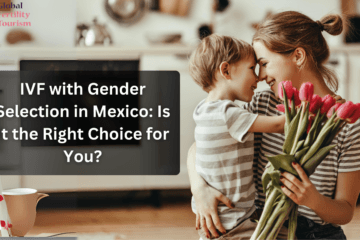In Vitro Fertilization (IVF) has revolutionized reproductive medicine, offering hope to millions struggling with infertility. Among the advancements in this field is the ability to select the gender of a child during the IVF process. This technique, while a marvel of medical science, ignites profound ethical and legal debates. It’s a subject particularly poignant in Mexico, a country with its unique cultural and legal landscape.
Mexico, with its rapidly evolving healthcare system, has become a hub for advanced IVF treatments, attracting both local and international attention. Gender selection, as part of these treatments, presents unique challenges and opportunities within the Mexican medical community. Understanding how Mexico navigates these complex waters offers insights into the broader conversation about reproductive technology’s role in our society.
This blog post aims to delve into the intricate web of ethical, legal, and medical aspects of gender selection in IVF, with a specific focus on Mexico’s clinics. By examining this issue from multiple angles, we aim to provide a comprehensive understanding of how gender selection is approached in a Mexican context, and what it means for the future of reproductive medicine.
Table of Contents
Understanding IVF and Gender Selection
IVF is a process where eggs are fertilized by sperm outside the body, in a controlled laboratory environment. This technique has been a beacon of hope for many couples facing infertility. Over the years, IVF has evolved, incorporating sophisticated methods to increase success rates and address specific patient needs, including the option of gender selection.
Technologies Enabling Gender Selection
The ability to select a child’s gender during IVF is made possible by technologies such as Preimplantation Genetic Diagnosis (PGD) and Preimplantation Genetic Screening (PGS). These procedures involve screening embryos for genetic conditions and also allow determination of the sex chromosome makeup, thus enabling gender selection. This technology is not just a tool for family balancing but also plays a crucial role in preventing sex-linked genetic disorders.
Prevalence and Reasons for Gender Selection in IVF
In Mexico, as in many parts of the world, gender selection is sought for various reasons. Some couples aim for a balanced family with children of both genders, while others may wish to avoid sex-linked genetic diseases. The prevalence of this practice in Mexico’s IVF clinics underscores the importance of understanding its ethical, legal, and medical dimensions.
Ethical Considerations
The ethical debate surrounding gender selection in IVF is robust and multifaceted. Proponents argue that it is a matter of reproductive autonomy, allowing parents the choice to balance their families as they see fit. They also point to its role in preventing genetic diseases. On the other hand, opponents raise concerns about potential gender imbalances in society, the commodification of children, and the moral implications of ‘designer babies’.
Cultural and Societal Implications
In Mexico, where family and cultural values play a significant role, the ethical implications of gender selection are particularly pronounced. The choice of a child’s gender can reflect deep-seated cultural preferences and biases, which raises concerns about reinforcing gender stereotypes and inequalities. The ethical considerations in Mexico thus extend beyond individual choice to broader societal impacts.
Ethical Guidelines in Mexico and International Comparisons
Mexico’s approach to the ethical governance of gender selection in IVF is still evolving. Unlike some European countries, where gender selection is heavily restricted or banned for non-medical reasons, Mexican regulations are more lenient, reflecting a different ethical stance. However, this also means that clinics and practitioners must navigate a landscape where ethical guidelines are less clearly defined, compared to places with more stringent laws.
Legal Landscape in Mexico
In Mexico, the legal framework governing IVF and gender selection is less rigid than in many other countries. There are no specific laws prohibiting gender selection for non-medical reasons, giving clinics and patients considerable latitude. This legal environment reflects Mexico’s more permissive stance on reproductive technologies.
Comparison with International Legal Frameworks
Internationally, the legal landscape varies widely. Countries like the UK and Canada have strict regulations prohibiting gender selection except for medical reasons, while others, like the United States, offer more freedom in this regard. Mexico’s position sits somewhere in between, providing a unique case study in how different legal systems approach this complex issue.
Impact of Legal Restrictions on Patients and Clinics
The relatively open legal environment in Mexico has implications for both patients and clinics. It attracts a diverse patient population, including international clients seeking services unavailable in their home countries. For clinics, this means navigating a multicultural patient base with varying expectations and ethical viewpoints, a challenge that requires sensitivity and adaptability.
Medical Insights from Mexican Clinics
Mexican clinics are at the forefront of adopting cutting-edge IVF technologies, including those enabling gender selection. The integration of advanced genetic screening methods demonstrates Mexico’s commitment to providing comprehensive reproductive healthcare. These technological strides not only improve success rates but also ensure safer and more effective treatments.
Success Rates and Medical Outcomes
Mexican clinics report success rates comparable to some of the best in the world, a testament to their medical expertise and technological adoption. The outcomes in gender selection procedures are particularly noteworthy, showcasing the precision and reliability of the techniques used. This success has positioned Mexico as a go-to destination for those seeking IVF treatments, including gender selection.
Patient Stories and Experiences
The stories of patients who have undergone IVF with gender selection in Mexico are diverse and illuminating. From couples seeking to balance their families to those avoiding genetic diseases, these personal narratives highlight the profound impact of these technologies. They also shed light on the emotional and psychological aspects of IVF, aspects that are as important as the medical and technical ones.
The Future of Gender Selection in IVF
The field of IVF, including gender selection, is continually evolving, with new technologies and methods emerging regularly. Innovations in genetic screening and embryo analysis promise even more precise and efficient procedures. In Mexico, the adoption of these advancements will shape the future landscape of IVF treatments.
As technology advances, ethical and legal frameworks may need to adapt. In Mexico, this could mean the development of more comprehensive guidelines and regulations, balancing the need for innovation with ethical considerations. The ongoing debate will likely shape how gender selection in IVF is perceived and practiced.
Predictions and Implications for Mexican Clinics
For Mexican clinics, the future holds both challenges and opportunities. Staying at the forefront of technological advancements while navigating the evolving ethical and legal landscape will be crucial. The potential growth in demand for gender selection services could position these clinics as global leaders in the field, but this will also require careful management of ethical responsibilities and public perception.
If you’re intrigued by the possibilities of IVF and gender selection or have questions about how these technologies could fit into your journey, we’re here to help. Reach out to us for a personalized consultation. Our team of experts is ready to provide you with the information and support you need to make informed decisions.
Whether you’re just starting to explore your options or are ready to take the next step, we’re here to guide you every step of the way. Contact us today to start your journey towards fulfilling your family dreams.



